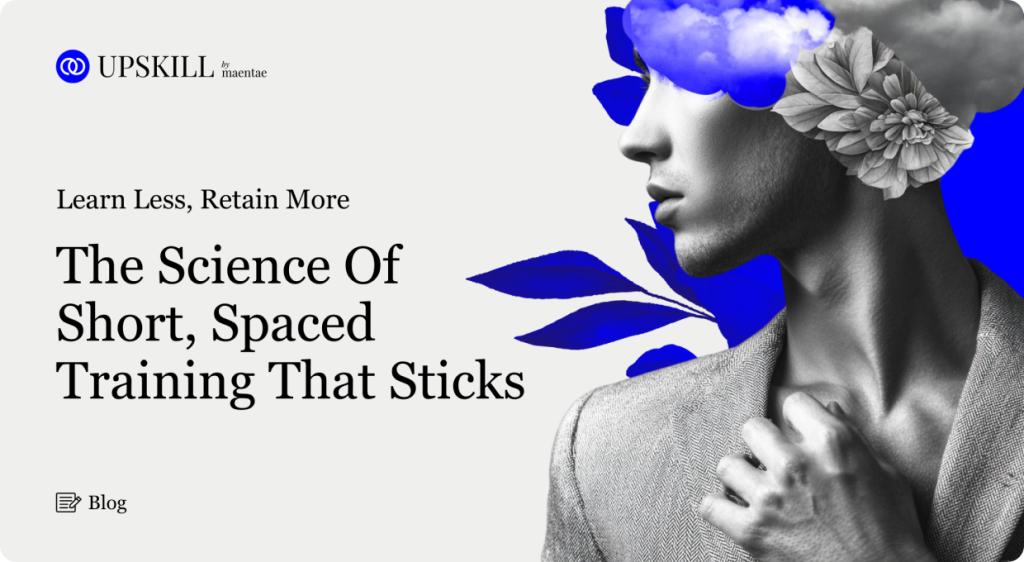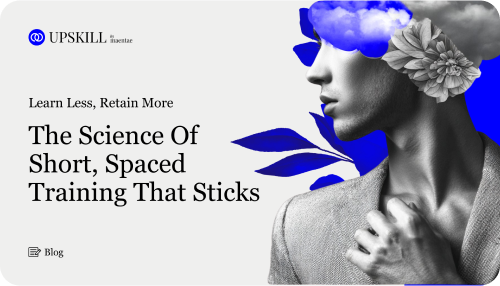maentae
Learn Less, Retain More: The Science Of Short, Spaced Training That Sticks

You are busy. Your calendar is a wall. And yet the skills you need keep moving. The last time you took a weekend bootcamp, you remembered the vibe on Monday and forgot the steps by Friday. That is not a failure of willpower. It is how memory works. The good news is that a different approach solves the problem most mid‑career professionals face: too little time, too much content, and very little that sticks.
Why long courses fade fast
Most programs cram content into a short burst, then hope you will somehow apply it at work. Cognitive science predicts the fade. Without spaced practice and retrieval, new knowledge decays quickly. Recent classroom and professional education syntheses show that distributing learning over time produces meaningfully better long‑term retention and real‑world behavior change than massed study. A 2025 review on the distributed practice effect and a 2024 systematic review of spaced digital education reach the same conclusion: shorter, spaced sessions win when you need the skill a month later, not just the day after the workshop.
The two mechanics your brain loves
A 2-week plan that respects your calendar
If your pain point is time, design around it. Trade three hours once for three twenty‑minute sessions each week, plus five minutes of retrieval. Week one, pick one workflow that trips your team. Practice a small technique, like writing a tighter prompt, cleaning a column of data, or drafting a one‑page decision note. Close the session with a quick retrieval check: write down the three steps without looking, then run them once in a live file. Week two, raise the bar. Change the data set or the audience. Run the same steps, collect one metric that proves the difference, and share a short note with your manager.
By the end of fourteen days you will have two artifacts that your future self can use: a cheat sheet you wrote from memory and a before‑after example tied to a metric you care about. This is what spaced learning buys you in a busy job. Not more theory. Repeatable moves that survive the week.
Make learning visible so it compounds
What to do when your team is skeptical
Colleagues will ask for a long course because long feels serious. Share the evidence and start small. Propose a sprint with three short sessions, a single measured workflow, and a one‑page readout. Point to the 2024 review of spaced digital education to explain why your plan outperforms a one‑off workshop for on‑the‑job behavior change. Then let the results speak. If the team sees a measurable drop in rework or a faster weekly report, your approach earns the right to scale.
How UPSKILL by maentae helps
UPSKILL is built for professionals who need progress without pause. We design sprints around spacing and retrieval on purpose, then coach you to package the results as artifacts your manager trusts. You leave with skills that survive busy weeks and show up in your metrics.
Ready to learn less and retain more. Visit maentae.com/upskill to learn more or contact us for a free consultation.
Sources
Mawson, R. D. et al. The Distributed Practice Effect on Classroom Learning (2025).
https://pmc.ncbi.nlm.nih.gov/articles/PMC12189222/
Martinengo, L. et al. Spaced Digital Education for Health Professionals: A Systematic Review and Meta-analysis (2024).
https://pmc.ncbi.nlm.nih.gov/articles/PMC11502984/
Bego, C. R. et al. Single‑paper meta‑analyses of the effects of spaced retrieval in STEM education (2024).
https://stemeducationjournal.springeropen.com/articles/10.1186/s40594-024-00468-5
Thompson, C. P. et al. The Effectiveness of Spaced Learning, Interleaving, and Retrieval Practice (2023).
https://www.sciencedirect.com/science/article/pii/S1546144023006464
Discover Our Blogs

Portfolio Over Perfect Grades: How To Stand Out In 90 Days
A short, confidence-building playbook to assemble a portfolio recruiters can trust.

Learn Less, Retain More: The Science Of Short, Spaced Training That Sticks
Translate robust learning science into a simple weekly routine busy pros will actually follow.

Micro-Credentials With Macro Signal: How To Pick Ones Employers Trust
Cut through the noise by showing how to vet micro-credentials that stack into meaningful advancement.

